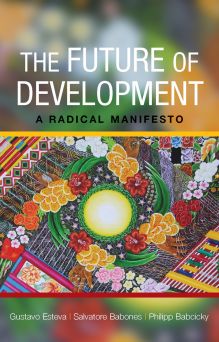The Future of Development: A Radical Manifesto

A thought-provoking book, The Future of Development builds upon the recognition that “development” is a political concept. By unpacking the contextual and ideological origins of the words “development” and “underdevelopment” in the post-war world order, the authors revisit many of the critiques of post-development theorists. They do so not with the goal to sow despair but to challenge and inspire development scholars and practitioners, especially by bringing to the fore contemporary critical alternatives that defy the reductionist development paradigm.
Not only the conceptual lens but also the statistical lens of the development enterprise is problematized. A detailed account of conventional development indicators illustrates how they have been designed and produced according to the ideologies and interests of the institutions supporting their production. GDP, GDP per capita, and annual GDP growth rates became the key metrics by which “development” was – and in many cases still is – judged, reflecting the cult of economic growth underpinning the notion of development. The authors argue that economic connotations of development have largely pervaded the “basic needs” discourse, commoditizing food, education, health and land, and sanctioning a universal way of “consuming” and satisfying those needs.
Transcending the socially constructed discourse around “needs” and the “essential” modern commodities (food, education systems, healthcare systems and housing development) to satisfy them, this radical manifesto calls for thinking and acting towards the recovery of individual and collective agency. In other words, moving away from food consumption to “eating”; from education to “learning”; from healthcare to “healing”; from housing development to “settling”. The alternative concept of buen vivir – that is, the state of living well – incorporates the return to self-determination into the art of living and acknowledges that cultural diversity is not only desirable but also a precondition for harmony among people and the flourishing of society.
Rather than a utopia, this is actually happening. The authors explore innovative bottom-up initiatives that, through daily transformation conceived and implemented by ordinary people, are contributing to real social change. The experiences and testimonies of social movements on the margins of economic societies are portrayed across the entire book. From the Zapatistas and Via Campesina, to the Occupy movement and indignados, these are vivid examples of a global collection of communities and an amalgamation of local movements unfolding at the grassroots level that represent the marginalized but the majority of people in the world today.
“How can I help?” is probably the rhetorical question most development scholars and practitioners would have vis-à-vis the radical critique to the development enterprise. The authors’ response is an urgent call for self-reflexivity as the bedrock principle in a world where we are so indoctrinated by the development ideology. In other words, “a constant reminding to look, listen, and learn rather than to ignore, instruct, and impose”.
Book note prepared by María Evangelina Filippi
Search the Book notes database
Our Book notes database contains details and summaries of all the publications included in Book notes since 1993 - with details on how to obtain/download.
Use the search form above, or visit the Book notes landing page for more options and latest content.
For a searchable database for papers in Environment and Urbanization, go to http://eau.sagepub.com/

